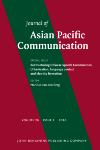
Journal of Asian Pacific Communication
Scope & Guideline
Unraveling the intricate tapestry of communication across the region.
Introduction
Aims and Scopes
- Sociolinguistics and Language Identity:
The journal explores how language shapes and reflects identity across various communities in the Asian Pacific, examining the dynamics of multilingualism, heritage languages, and language ideologies. - Media and Communication Studies:
It investigates the role of media in shaping public discourse, particularly in the context of cultural narratives, social movements, and the impact of crises such as the COVID-19 pandemic. - Cultural Studies and Gender Issues:
The journal addresses cultural phenomena through the lens of gender and sexuality, analyzing how these aspects intersect with communication practices within diverse Asian contexts. - Transnational and Diaspora Studies:
It focuses on the experiences of diasporic communities, exploring themes of migration, identity transformation, and the linguistic practices that emerge in multicultural settings. - Educational Practices and Pedagogy:
The journal emphasizes the importance of culturally sustaining pedagogies in educational contexts, particularly for immigrant and refugee populations, highlighting effective communication strategies in diverse classrooms.
Trending and Emerging
- Digital Communication and Online Communities:
There is a growing interest in how digital platforms facilitate communication among marginalized groups, particularly in the context of health and social support, as seen in the exploration of online communities. - Intersectionality in Gender and Sexuality:
Emerging themes focus on the intersectionality of gender and sexuality, examining how these identities are negotiated and expressed in various cultural contexts, especially through social media. - Crisis Communication and Public Discourse:
Research addressing the role of media and communication during crises, such as the COVID-19 pandemic, is trending, highlighting the importance of framing public discourse in times of uncertainty. - Linguistic Landscapes and Identity:
There is an increased focus on how linguistic landscapes reflect cultural identities and social dynamics in urban settings, emphasizing the role of language in shaping community narratives. - Culturally Sustaining Pedagogies:
A significant trend is the emphasis on culturally sustaining pedagogies that support the educational needs of diverse student populations, particularly in immigrant and refugee contexts, reflecting a commitment to inclusive education.
Declining or Waning
- Traditional Language Studies:
Research focusing solely on traditional language studies, without connecting to broader sociocultural contexts, seems to be less frequent, indicating a movement towards more integrated approaches. - Static Gender Roles:
Papers that address gender roles in a static manner, without considering evolving identities and intersectionalities, are becoming less common, as the discourse increasingly embraces fluidity and complexity. - Historical Linguistics:
Themes centered on historical linguistics and the evolution of languages in isolation may be waning, with a growing preference for studies that connect historical context to contemporary issues. - Non-Interactive Media Analysis:
There is a noticeable decline in research focusing solely on non-interactive media forms, suggesting a shift towards examining interactive and participatory media that engage audiences more dynamically. - Narrow Cultural Studies:
Research that focuses on narrow aspects of culture without considering broader implications or intersections with communication practices is appearing less frequently, reflecting a trend towards more holistic analyses.
Similar Journals
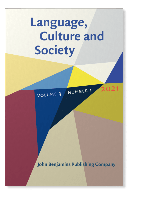
Language-Culture and Society
Illuminating the Interplay Between Words and WorldsLanguage-Culture and Society is a premier academic journal dedicated to advancing the understanding of the intricate relationships between language, culture, and society. Published by the esteemed John Benjamins Publishing Co in the Netherlands, this journal has quickly established itself as a leading platform since its inception in 2019, achieving a notable Q1 ranking in Linguistics and Language as of 2023. With a focus on interdisciplinary studies, Language-Culture and Society invites researchers, practitioners, and students to contribute and explore themes such as linguistic diversity, cultural identity, and communication practices. Despite being a non-open access publication, the journal provides unparalleled access to high-quality research articles that significantly impact the fields of linguistics and social sciences. The journal's robust Scopus rankings, placing it in the top percentiles of both Arts and Humanities and Social Sciences categories, underline its importance and relevance in contemporary linguistic discourse. Join the expanding community engaged in scholarly discussion through this vital resource, bridging the gap between theoretical insights and practical applications in today's multilingual societies.

MODERNA SPRAK
Exploring the Frontiers of Linguistic InnovationMODERNA SPRAK, published by LMS-Modern Language Teachers Association, is a vital journal in the field of linguistics and language studies that has been contributing to academic discourse since its inception in 2002. With an ISSN of 2000-3560, this Swedish journal provides a platform for researchers, educators, and language enthusiasts to explore contemporary issues and advancements in linguistics. Despite its Q4 category ranking in the 2023 category quartiles, its focus on diverse linguistic perspectives and innovative methodologies ensures its continued relevance and importance. As of 2023, it holds notable ranks within Scopus, placing it within the lower percentile of its categories—yet this offers a unique opportunity for emerging scholars to contribute to its growth and visibility. While MODERNA SPRAK is not an open access journal, it serves as a rich resource for academic networking and knowledge sharing in the evolving landscape of language education and research. The journal's commitment to fostering scholarship within an inclusive framework makes it an essential read for those engaged in the language sciences across various educational contexts.
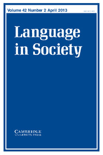
LANGUAGE IN SOCIETY
Advancing Understanding of Language and SocietyLANGUAGE IN SOCIETY, published by Cambridge University Press, is a leading interdisciplinary journal that explores the intricate relationship between language and social factors. With an impressive track record since its inception in 1972, this journal has become a critical resource for researchers and practitioners in the fields of linguistics, sociology, and political science, as evidenced by its high ranking in both the Q1 quartile and Scopus percentile rankings. In 2023, it was placed within the top 94th percentile among its peers in language and linguistics and the 93rd percentile in sociology. Furthermore, LANGUAGE IN SOCIETY provides an insightful platform for understanding language as both a social practice and a key element of identity and power dynamics. Although it does not currently offer Open Access options, its rigorous peer-reviewed content remains essential for advancing scholarship and informing professional practice in the study of language in diverse societal contexts. With its scholarly contributions, LANGUAGE IN SOCIETY continues to shape discourse and foster academic collaboration across disciplines.

Signo y Sena-Revista del Instituto de Linguistica
Pioneering research that shapes the future of language.Signo y Sena-Revista del Instituto de Linguistica is an esteemed academic journal published by the University of Buenos Aires, focusing on the intricate field of linguistics. With an ISSN of 2314-2189, this journal serves as a vital platform for the dissemination of innovative research and interdisciplinary studies pertaining to language and communication. Having adopted an Open Access model since 2012, it ensures that cutting-edge research is accessible to a global audience, fostering collaboration and knowledge sharing among scholars and practitioners. Through its commitment to high-quality peer-reviewed content, Signo y Sena plays a significant role in advancing the linguistic research landscape, making it an essential resource for researchers, professionals, and students alike who are dedicated to exploring the complexities and nuances of language. Located in Buenos Aires, Argentina, the journal invites contributions that not only enhance theoretical frameworks but also provide practical insights into linguistic applications.
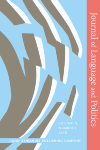
Journal of Language and Politics
Examining the Nexus of Communication and GovernanceThe Journal of Language and Politics, published by John Benjamins Publishing Co, stands at the forefront of interdisciplinary research, merging the fields of linguistics, political science, and sociology. With an ISSN of 1569-2159 and an E-ISSN of 1569-9862, this esteemed journal has been a pivotal platform for scholarly discourse since its inception in 2002. As of 2023, it holds a prestigious Q1 ranking in multiple categories, including History, Linguistics and Language, and Sociology and Political Science, showcasing its significant impact and relevance within the academic community. Researchers, professionals, and students will find a wealth of rigorously peer-reviewed articles that explore the intricate ways language influences political behavior, social structures, and cultural discourse. Although not an open access journal, it remains an essential resource for those invested in understanding the dynamic interplay between language and politics, enriching the study of social phenomena on a global scale.

Italiano LinguaDue
Connecting Scholars Through the Italian LanguageItaliano LinguaDue is a leading journal dedicated to the exploration and study of the Italian language and its various facets. Published by Milano University Press, this journal provides an essential platform for academics, linguists, and language enthusiasts interested in the evolving dynamics of Italian linguistics, literature, and cultural studies. Since its transition to Open Access in 2009, it has broadened its reach, allowing researchers globally to share and disseminate their findings without the barriers of subscription fees. Although currently lacking an H-index and specific Scopus rankings, the journal remains committed to advancing scholarly discourse in its field, fostering a collaborative environment for publication among its contributors. By consistently publishing high-quality peer-reviewed articles, Italiano LinguaDue plays a vital role in enriching the academic landscape surrounding the Italian language, making it indispensable for researchers, professionals, and students alike.
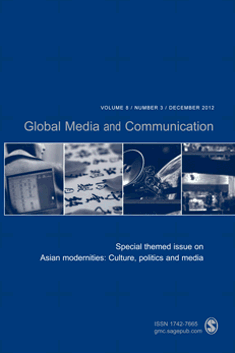
Global Media and Communication
Illuminating the Complex Ties Between Media and CultureGlobal Media and Communication is a premier journal dedicated to advancing the fields of media and communication studies, published by SAGE Publications Ltd. With an ISSN of 1742-7665 and an E-ISSN of 1742-7673, this journal offers a platform for scholarly discourse and innovative research that explores the intricate relationships between global media practices and communication strategies. Recognized as a Q1 journal in both the Arts and Humanities (Miscellaneous) and Communication categories for 2023, it stands out in its commitment to delivering high-quality, peer-reviewed articles that contribute to the understanding of contemporary media landscapes. Located in London, United Kingdom, the journal benefits from being at the heart of cultural and digital innovation. Researchers, professionals, and students can look forward to insightful articles that not only critique existing frameworks but also propose new methodologies, ensuring that Global Media and Communication remains a vital resource for anyone interested in navigating the evolving dynamics of media and communication on a global scale.
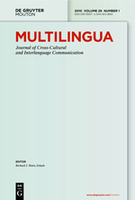
Multilingua-Journal of Cross-Cultural and Interlanguage Communication
Pioneering Research in Language and Cultural ExchangeMultilingua: Journal of Cross-Cultural and Interlanguage Communication is a premier academic journal published by DE GRUYTER MOUTON, specializing in the dynamic fields of communication and linguistics. Established in 1982, this journal has significantly contributed to the discourse surrounding multilingualism, intercultural interactions, and language acquisition, with a notable reputation backed by an impressive Q1 ranking in both Communication and Linguistics and Language for 2023. Positioned strategically at the heart of Germany, the journal serves as a vital platform for researchers, professionals, and students alike, fostering scholarly exchange and insights into cross-cultural communication practices. With rankings placing it in the top percentiles across key categories in Scopus, including Arts and Humanities and Social Sciences, Multilingua exemplifies the highest standards of academic excellence. Although currently not an Open Access journal, it continues to provide a wealth of knowledge to the global research community.
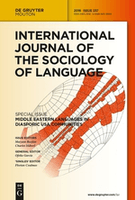
International Journal of the Sociology of Language
Bridging Linguistics and Social Sciences for Deeper UnderstandingInternational Journal of the Sociology of Language (ISSN: 0165-2516, E-ISSN: 1613-3668) is a premier academic journal published by WALTER DE GRUYTER GMBH in Germany, focusing on the intricate relationship between language and society. Since its establishment in 1974, this journal has continued to serve as a vital platform for disseminating high-quality research and theoretical discussions within the realms of linguistics and social sciences. Notably, it holds an impressive Q1 ranking in Linguistics and Language and maintains robust positions in Scopus rankings, being placed in the 84th and 83rd percentiles in the Arts and Humanities and Social Sciences categories, respectively. The journal not only emphasizes the socio-linguistic aspects of language use but also aims to foster interdisciplinary dialogue, making it indispensable for researchers, practitioners, and students pursuing an understanding of language within its social contexts. Although it is not an open-access publication, its rich content and scholarly contributions continue to have a significant impact within the field, making it a recommended read for anyone interested in the sociolinguistic landscape.
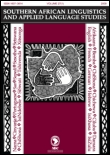
Southern African Linguistics and Applied Language Studies
Fostering Innovation in Language StudiesSouthern African Linguistics and Applied Language Studies is a prestigious journal dedicated to the exploration and analysis of linguistics and applied language studies within the Southern African context. Published by Taylor & Francis Ltd, this esteemed journal has established itself as a significant platform for scholars and practitioners since its inception in 2003. With an impressive Q2 ranking in the Linguistics and Language category and a current Scopus rank of #430 out of 1167, it occupies a vital position in the academic landscape, appealing to a diverse readership keen on linguistic research, language policy, and applied linguistics. While the journal is not currently open access, it provides comprehensive insights and scholarly articles that foster understanding and innovation in linguistic practices and language education. As of 2024, the journal continues to deepen its impact through rigorous peer-review and a commitment to advancing knowledge, making it a key resource for researchers, educators, and students seeking to navigate the complexities of language within the Southern African region and beyond.